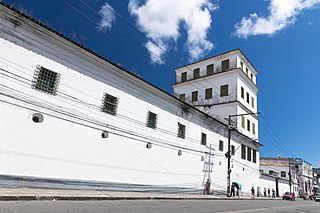Related Research Articles

DomPedro I, also known as "the Liberator", was the founder and first ruler of the Empire of Brazil. As King Dom Pedro IV, he reigned briefly over Portugal, where he also became known as "the Liberator" as well as "the Soldier King". Born in Lisbon, Pedro I was the fourth child of King Dom John VI of Portugal and Queen Carlota Joaquina, and thus a member of the House of Braganza. When the country was invaded by French troops in 1807, he and his family fled to Portugal's largest and wealthiest colony, Brazil.

Caatiba is a municipality in the state of Bahia, Brazil. In 2020 it had 6,488 inhabitants. Until 1961 it belonged to the municipality of Vitória da Conquista when it became independent. In 1962 the first election took place and the mayor elected, Iris Geraldo Silveira, started his term in 1963.

Teófilo Odorico Dias de Mesquita was a Brazilian poet, journalist and lawyer, nephew of the famous Romantic author Gonçalves Dias.

Maria do Amaral Ribeiro is a Brazilian actress, screenwriter and film director.

Events from the year 2013 in Brazil.

Events in the year 1908 in Brazil.

Events in the year 1976 in Brazil.

Events in the year 2015 in Brazil:

Events in the year 1979 in Brazil.
Maria Filipa de Oliveira was an Afro-Brazilian independence fighter from island of Itaparica, Bahia, active during the Brazilian War of Independence. The independence struggled against the Portuguese lasted a little over a year, with many battles centered on the Island of Itaparica. Maria Filipa is noted as one of three women who participated in the struggle for Bahia's independence in 1823, the others being the military figure Maria Quitéria (1792-1853) and Sister Joana Angélica (1761-1822).

The Constituent Cortes of 1820, formal title The General and Extraordinary Cortes of the Portuguese Nation, also frequently known as the Sovereign Congress or the Cortes Constituintes Vintistas, was the first modern Portuguese parliament. Created after the Liberal Revolution of 1820 to prepare a constitution for Portugal and its overseas territories, it used a different system from the traditional General Cortes for choosing representatives, and the three traditional feudal estates no longer sat separately. The Cortes sat between January 24, 1821 and November 4, 1822 at the Palácio das Necessidades in Lisbon. The work of the Constitutional Cortes culminated in the approval of the Portuguese Constitution of 1822.

Daniella Velloso Borges Ribeiro is a federal senator of Brazil representing her home state of Paraíba. She was previously served in the Legislative Assembly of Paraíba from 2011 to 2019 and was vereador of Campina Grande from 2009 to 2011.

The Church and Convent of Our Lady of the Conception of Lapa (Portuguese: Igreja e Convento de Nossa Senhora da Conceição da Lapa is an 18th-century Roman Catholic church located in Salvador, Bahia, Brazil. The church is dedicated to Our Lady of the Conception and is part of the Roman Catholic Archdiocese of São Salvador da Bahia. It is known as key site in the Brazilian independence movement in the early 19th century. Sister Joana Angélica resisted the invasion of Portuguese troops into the convent and was killed by bayonet in 1822 at the south portal of the convent.

Lucília Simões was a Brazilian-born Portuguese actress, stage director and impresario.

Rosa Damasceno was a 19th-century Portuguese actor.

Nicolau Pereira de Campos Vergueiro, better known as Senator Vergueiro, was a Portuguese-born Brazilian coffee farmer and politician. He was a pioneer in the implementation of free workforce in Brazil by bringing the first European immigrants to work in the Ibicaba farm, which he owned. The contract was prepared by Vergueiro himself, establishing ownership of the production and other measures, mostly of an exploitive nature. Faced with this, the immigrants working in Vergueiro's main property, the Ibicaba farm, revolted under the guidance of Thomas Davatz, a Swiss immigrant and religious leader, who instigated the immigrant workers to grow their ambition to become small or medium-sized landowners, as they imagined they would be when they had left Europe.
Maria Helena de Moura Neves was a Brazilian linguist known for her work on language use, especially functional approaches to Portuguese grammar. She also conducted research on the history and teaching of grammar. She was professor emerita at São Paulo State University, and also lectured at Mackenzie Presbyterian University. In 2022 she received the Ester Sabino Award in the Senior Researcher category.
References
- 1 2 Maria Stella Orsini (31 December 1988). "Maria Angélica Ribeiro: uma dramaturga singular no Brasil do século XIX". Revista do Instituto de Estudos Brasileiros (in Portuguese and Brazilian Portuguese) (29): 75–82. doi:10.11606/ISSN.2316-901X.V0I29P75-82. ISSN 0020-3874. Wikidata Q104222850.
- ↑ "Casa M.A.R. - Maria Angélica Ribeiro". www.flip.org.br (in Brazilian Portuguese). Retrieved 17 December 2020.